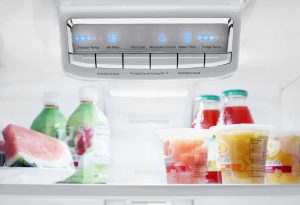Check the Power
The first thing to check is the power plug. No appliance can work without adequate power, and if the power plug is not functioning, your refrigerator will be unable to operate correctly.
Before you even think about calling a home appliance technician, ensure that you check the power is working correctly. If the power is intermittent, the compressor inside your refrigerator will not be running properly. This means that your food won’t stay cold.
Something as simple as a faulty socket or loose connection could be the reason for spoiled food.
Adjust Your Thermostat
If the thermostat is out of position, it can have a dramatic effect on your refrigerator’s cooling potential. Unfortunately, it is easy to nudge the thermostat when you’re cleaning or putting items in and out of the fridge.
Another possible issue is that your thermostat has been impacted by higher than average temperatures. If it is unseasonably hot outdoors, it is worth trying to turn the thermostat up by a point or two to see if this solves the problem.
This can take a little experimentation. Just don’t crank the thermostat all the way to max, or you could end up with ice on your delicate refrigerator items.
Clear the Vents
There reason why your refrigerator is not operating correctly could be due to a lack of air circulation. You may not realize it, but air movement is crucial for the cooling process inside your refrigerator. Air should freely flow between the compressor and all the compartments for adequate cooling.
Unfortunately, this can be inhibited by blocked vents. Find the vents in both the refrigerator and freezer sections and remove anything that could be blocking them. Try to avoid foods blocking the vent, so they are always clear for maximum cooling performance.
Don’t forget to check the vents in your freezer. The vents in your freezer can actually impact the performance inside the refrigerator compartment. If the freezer vents are blocked, it could prevent the flow of colder air.
Check Underneath the Appliance
While you may be very diligent about keeping your refrigerator clean and tidy, you may not appreciate that one of the most essential components is underneath your appliance. The mechanism underneath your refrigerator houses all the important components, including the compressor, coil, and fan.
These parts are the backbone of your refrigerator, so without them, your appliance will not operate properly. So, if your refrigerator is not cooling, one of these components may be out of position or clogged with debris.
Think about all the dust and dirt that can accumulate under your kitchen cabinets and consider how dirty this could make your refrigerator mechanisms.
Before you start cleaning, turn off the refrigerator and unplug it from the wall socket. Carefully pull out your refrigerator and use a soft brush or vacuum attachment to clear any debris. Avoid being too rough with your cleaning as you could cause further damage.
Once you’re done, turn the refrigerator back on and wait a while. You can then check if the refrigerator is performing better.
Check the Door Gaskets
The door gaskets are a crucial component to keep the cold air inside your refrigerator. Unfortunately, over time, they can become worn, loose, or damaged. This can allow the cold air to leak out and warm air to enter your refrigerator.
Wipe the gaskets down with a soft, damp cloth and then look for any signs of tears or rips. If you can’t see any damage, it doesn’t mean that the gaskets are perfect. The best way to check if your gaskets are working is to shut a piece of paper into the door. If you can move or pull out the paper when the door is closed, there is air escaping. You’ll need to replace the gasket or speak to your appliance technician to perform a repair.
Clear the Clutter
When you have a busy household, it can be very easy to cram your refrigerator with fresh items, leftovers, and drinks. Unfortunately, overfilling can inhibit air circulation and cause the refrigerator to be warmer than it should be.
The ideal scenario is to have your refrigerator approximately ⅔ full. This will help to prevent overstressing the refrigerator and compromising the foods you’re storing.
So, now is a good time to assess your refrigerator and clear any clutter. Check foods for expiration dates, have a couple of leftover meals, and make some space.
Check your Door Switch
Finally, it is worth checking your door switch. Some refrigerators may experience cooling problems due to a faulty switch.
When the door is open, refrigerators tend to stop active cooling. This resumes when the door switch is pushed down as the door closes. This should happen automatically, but if your switch is faulty, it may not occur.
The best way to check this is to press the door switch. If the refrigerator light goes off, the switch is working correctly. If it doesn’t, you need a repair.
If you’ve tried the above fixes and are still having refrigerator cooling issues, it is time to call in an appliance repair specialist. An experienced home repair technician can evaluate your refrigerator for underlying issues and provide a repair solution. You can then make an informed decision about whether your appliance can be successfully repaired or if it is time to consider an upgrade.
